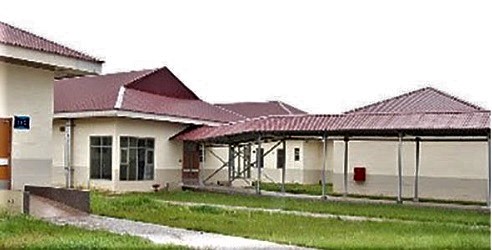As part of the efforts to ensure healthy lives for all, the government has invested heavily in the health sector in the Ashanti Region.
Currently, six health facilities are under construction, some of which have been completed, with the others at various stages of completion.
They are the over 40-year-old Maternity Block of the Komfo Anokye Teaching Hospital (KATH), the Afari Military Hospital, the 250-bed Regional Hospital at Sewuah in the Bosomtwe District, the Bekwai Municipal Hospital, the Kumawu District Hospital and the Konongo District Hospital.
This came to light during a recent tour of the facilities by the National Coordinator of the Monitoring and Evaluation Secretariat at the Presidency, Gifty Ohene Konadu, and her team.
The team was in the region to monitor and also inspect some of the ongoing projects in the region.
Commenting on the projects, Ms Konadu expressed the hope that when completed, the health facilities would aid in the rebound of the economy.
“It is the belief of this government that all the projects will be completed. The impact that this will have on the lives of the people will be massive. The President Akufo-Addo government is committed to transforming Ghana through massive development projects, and these are evident across the country,” she said.
KATH Maternity Block
The erstwhile NDC government, in 1999 and 2004, tried to reactivate the Maternity Block of KATH but could not do much before exiting office.
On Friday, May 15, last year, President Akufo-Addo cut the sod for the reactivation of the €155-million project after securing funding from the Deutsche Bank.
The project is expected to be completed in 2023.
When completed, the 750-bed Maternity and Children’s Block will serve as a referral centre for 12 out of the 16 regions in Ghana. It will have 10 operating theatres and diagnostic rooms, fully equipped with X-Ray, ultrasound and mammograph facilities.
The facility will also house an intensive care unit, a high dependency unit, isolation rooms and student lecture halls, with the capacity to provide catering services for staff, patients and students.
500-bed Military Hospital
Already behind schedule, the Military Hospital at Afari in the Atwima Nwabiagya District is a 500-bed facility being executed by Euroget De-Invest, an Egyptian Investment company.
When completed, it will be the second military hospital in the country, after the 37 Military Hospital in Accra, and will complement KATH as the two referral centres in the middle belt of the country.
It is one of the nine hospitals whose construction was awarded to the Egyptian construction firm.
According to the Resident Engineer of the project, Abou Shamaa, the hospital should be ready by December this year.
He said all the physical infrastructure, including staff accommodation facilities and medical blocks, had been completed, while the installation of equipment was at an advanced stage.
It has 15 operating theatres, Endoscopy operating Rooms, a central kitchen and laundry, a mortuary with a 153-body capacity, a parking area for 600 cars and 18 buses and 64 staff housing units.
Sewuah Regional Hospital
The 250-bed Regional Hospital at Sewuah in the Bosomtwe District was started in May 2015 by the erstwhile NDC government but work stalled for over one and a half years. It was reactivated by the current government as part of efforts to enhance healthcare delivery for the people in the Ashanti Region.
The facility, according to the Project Officer, Stephen Owusu Sekyere, was about 99 per cent complete.
The only challenges facing the project were the lack of an access road, reliable power and water supplies.
It has an administration block, a medical gas plant, a water treatment plant, an inpatient ward, a mortuary, a 20-unit staff accommodation, delivery suites, a gynaecology ward, a sterilisation department, a sewage treatment biogas plant and a power station.
Bekwai Hospital
The Bekwai Municipal Hospital is a 120-bed facility which was inaugurated by the President in November 2020.
It was initially started in the early 1970s but due to lack of funds, work stalled until 2010 when it was reactivated by the Ministry of Health. It, however, suffered another setback in 2013 as a result of the lack of funding.
Through a structured funding from Ellipse Projects to the tune of €23 million in 2018, the project was reactivated and eventually completed in 2020.
Key facilities at the hospital include an Accident and Emergency Unit, a mortuary, a kitchen, a laundry, a Central Sterile Services Department and an X-ray and Ultrasound Unit.
At the inauguration of the facility in 2020, President Akufo-Addo said the completion of the facility was evidence of the government’s commitment to continue with major infrastructural projects inherited from the previous government “so that their expected socio-economic benefits can be enjoyed by all”.
Konongo District Hospital
Although completed, the 60-bed Asante Akim Central Municipal Hospital is yet to become operational due to the nature of the road leading to the facility.
The 1.4-km road, which has been awarded to Agyakot Company Limited, is yet to be completed, thereby delaying the operationalisation of the facility.
The hospital has facilities such as dental, cardiology, ophthalmology, paediatric, gynaecology and Orthopaedic clinics.
It also has four operating theatres, housing for lactating mothers, three wells serving as a backup to the main water supply system, a 10-unit staff accommodation facility, a 36-body capacity mortuary, a parking lot and an ambulance station.
Kumawu District Hospital
The Kumawu District Hospital, located in the Sekyere Afram Plains District, was scheduled to have been completed in 2017 but suffered some delay owing to the change in government.
Following the change, the $38.8-million project had to be redesigned to accommodate further expansion and also reflect the current needs of the people.
It is a 120-bed facility with the possibility to be expanded to 200 beds, and when completed, it will have two operating theatres and the full complement of a functional hospital with an ICU, surgical and medical wards, accident and emergency wards, OPD, among others.








